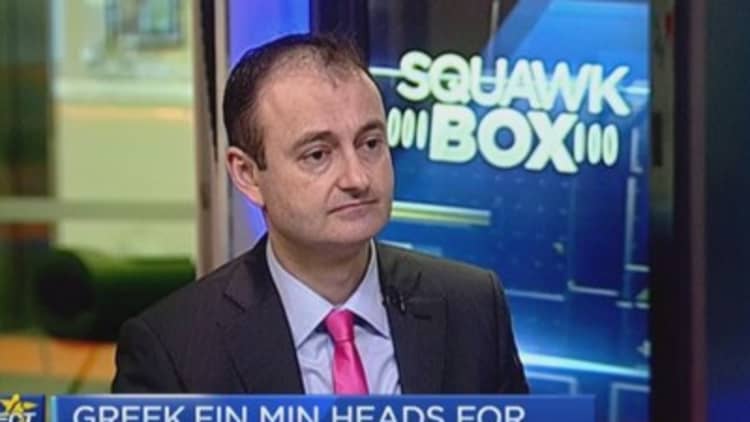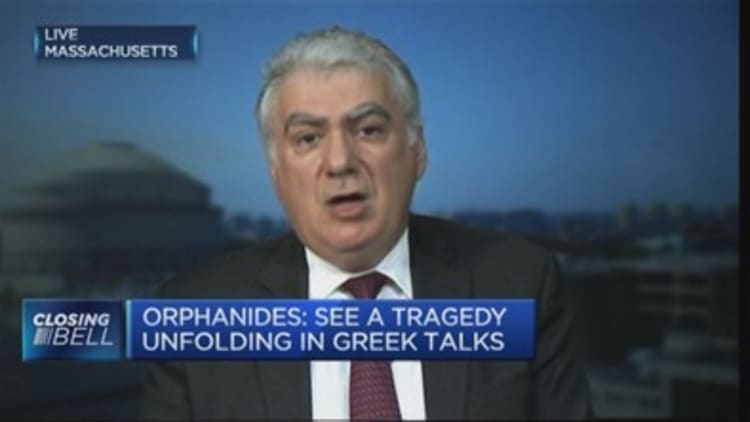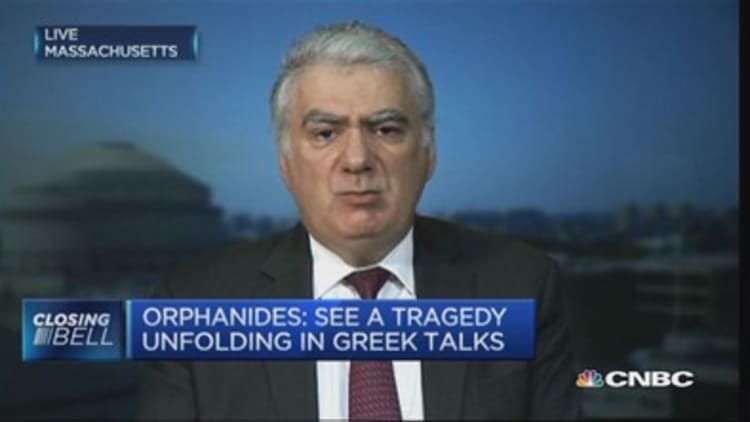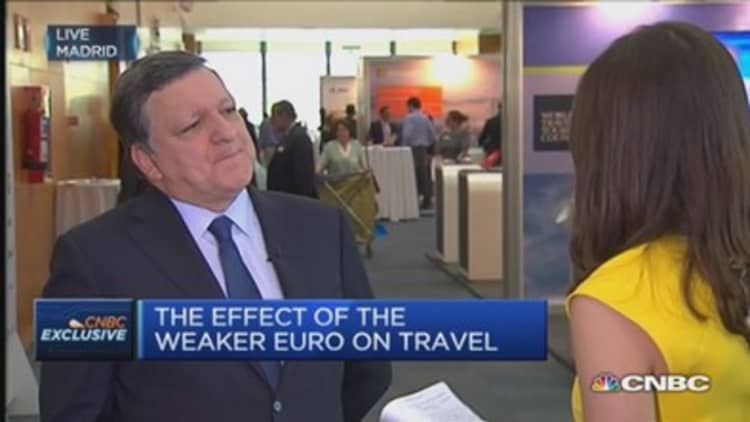



A U.K. bookmaker has stopped taking bets on Greece leaving the euro zone, saying it is increasingly likely that the country could "begin the process of departing" very shortly.
William Hill closed their book on whether Greece will leave the euro zone during 2015, and on which country would be first to leave the euro zone, the bookmaker said Wednesday evening.
"Greece had been heavily backed down to 1/5 to be the first to quit the euro zone, and we'd also been shortening the odds for Greece to leave during 2015. They'd come down from 5/1 to 3/1.' William Hill spokesman Graham Sharpe said in a press release.
He added that "it is now looking increasingly likely that they could begin the process of departing very shortly."
It comes as one analyst told CNBC Thursday that the country faced a "slow-death scenario"—including a default and messy exit from the euro zone—as the country's economic crisis took another turn for the worse following a credit rating downgrade.
BofA Merrill Lynch Global Research's Thanos Vamvakidis warned Thursday that if Greece fails to reach a deal with its European partners, a Grexit—or Greek exit from the euro zone becomes inevitable.
His comments come after Greece's unresolved negotiations with its international creditors prompted ratings agency Standard & Poor's to cut its credit rating to "CCC+" from "B-" with a negative outlook.
"Without an agreement (with creditors over reforms), without official funding, there is a very high probability that Greece will default sometime in May and this could lead to a very negative scenario," Thanos Vamvakidis, head of European G10 FX strategy at BofA Merrill Lynch Global Research, told CNBC Thursday.
He said that although nobody wants that, "the more they delay the higher the risks."
"(A Grexit) is not going to be overnight. It would be a slow-death scenario and in a way we are in this scenario. Something needs to change in order to avoid an accident," he added.
Reform discussions between Greece and the bodies overseeing its bailout program—the European Commission, European Central Bank and International Monetary Fund—have been unsuccessful over recent weeks. The country's creditors agreed to extend its bailout program by four months in February in order to give Greece's new leftwing government more time to enact reforms.
Lack of progress on reforms means Greece's last tranche of aid—needed in order to make loan repayments to the IMF and ECB in the coming weeks and months—has not been released. Indeed, S&P warned that "without deep economic reform or further relief, we expect Greece's debt and other financial commitments will be unsustainable."
According to a report in the Financial Times on Thursday, Greek officials made an informal approach to the IMF to delay repayments, but those rescheduling requests were rebuffed, the newspaper said, citing unnamed officials briefed on the talks.
Read MoreGreece hits back at reports of euro zone 'shock'
According to Vamvakidis, the country will run out of money if its immediate funding needs are not addressed at the meeting of the Eurogroup of euro zone finance ministers on April 24.
"This has definitely taken much longer than many of us expected," he said. "We need a deal in the Eurogroup, the Greek parliament needs to approve the deal and they need to find a way to fund Greece in the meantime because the government has run out of money."
There is a glimmer of hope that the meeting on April 24 could yield some movement on reforms, but some officials are skeptical, with German Finance Minister Wolfgang Schaeuble saying Wednesday that he doubted a solution could be reached.
Game over for Greece?
The former president of the European Commission, Jose Manuel Barroso, told CNBC Wednesday that there was a risk Greece would be unable to come to an agreement with its euro zone creditors.
He said this could increase the risk of the country defaulting on its debt obligations or having to leave the euro zone—something he called a "taboo" scenario, which could set a dangerous precedent for the single currency bloc.
Read MoreRisk of a 'Grexit' is higher today: Barroso
While political analysts at Nomura, Alastair Newton and Frida Wallnor, put the probability of a Grexit at 40 percent in a note entitled "Game over for Greece?" published Wednesday, they warned that their prediction was "coupled with a sense that (the probability) is still rising with no clear sign of a reversal. "
"The main reason is what we see as the continuing propensity for rhetoric not just to dominate, but to overwhelm, substance in the exchanges between Greece and its euro zone partners," they wrote. "Indeed, we would go further and suggest that Greece may be closer to an exit today than it has been at any time since the start of the euro zone crisis."
Despite growing fears of a euro zone exit, some euro zone officials have refused to countenance such a scenario, which could bring with it significant upheaval and potentially disastrous consequences for the euro zone.
Not only could a default and Grexit prompt capital controls to prevent bank runs, international financial isolation and the introduction of a new currency in Greece, it could threaten the future of the 19-country single currency bloc.
Read MoreWhat would a Greek default look like?
Knowing that any such talk could spark international panic over Greece and the intergrity of the euro zone and its currency, the European Central Bank's President Mario Draghi dismissed fears of a Greek default Wednesday, saying he was not ready to even "contemplate" such a scenario.
Officials in the U.S. have openly warned over the risks posed by Greece, however. Greek Finance Minister, Yanis Varoufakis, is due to meet U.S. President Barack Obama on Thursday, and U.S. Treasury Secretary Jacob Lew on Friday (along with the ECB's Draghi and IMF officials).
Ahead of the meeting with his Greek counterpart, Lew said Wednesday that he would press Varoufakis to "engage proactively" with European officials to resolve the standoff over emergency financing, Dow Jones reported Wednesday.
- By CNBC's Holly Ellyatt, follow her on Twitter @HollyEllyatt. Follow us on Twitter: @CNBCWorld


